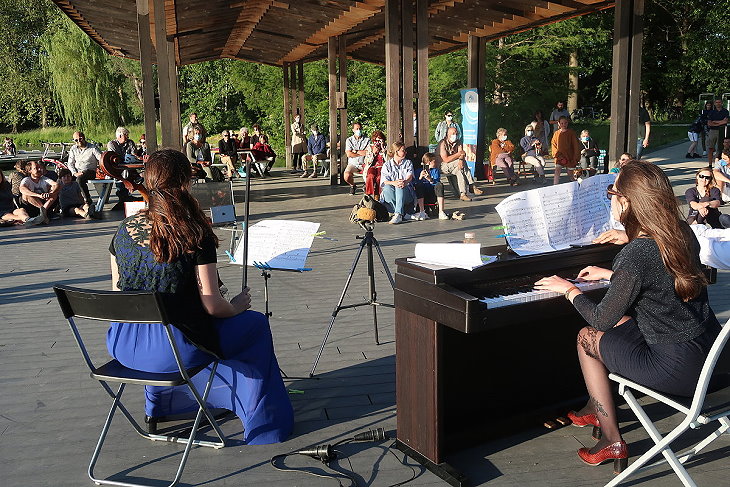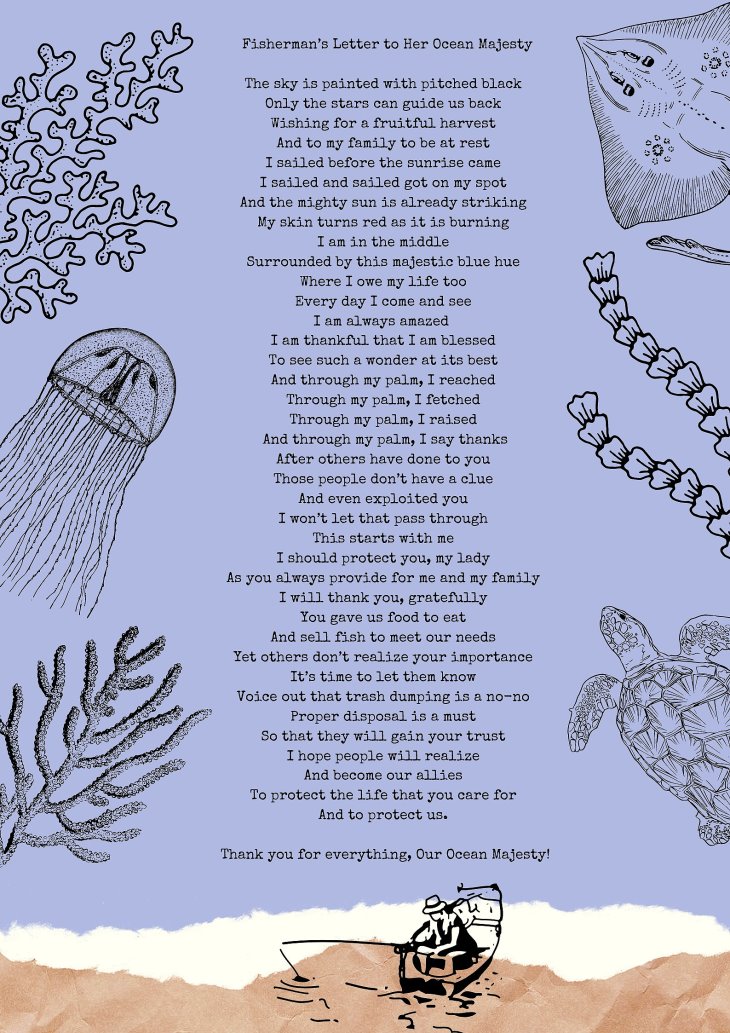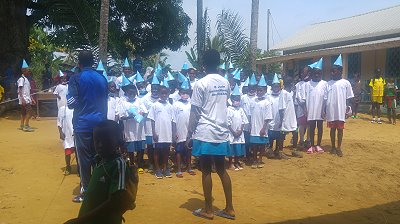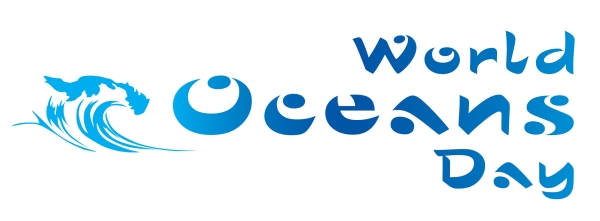 Congratulazioni ai vincitori del Concorso Mundus maris di questo anno, selezionati dalla giuria internazionale tra le 61 partecipazioni da 10 paesi. Il tema scelto dalle Nazioni Unite per la Giornata mondiale del oceano del 2021 era "Oceano: Vita e mezzi di sussistenza". Un tema che ha suscitato una vasta gamma di visuali. Abbiamo richiesto l'invio di contributi sotto forma di storie, poesie, immagini e video dividendoli in gruppi di età per tenere conto delle differenti esperienze di vita. Il Covid può aver ridotto il numero di contributi, ma certamente non la qualità.
Congratulazioni ai vincitori del Concorso Mundus maris di questo anno, selezionati dalla giuria internazionale tra le 61 partecipazioni da 10 paesi. Il tema scelto dalle Nazioni Unite per la Giornata mondiale del oceano del 2021 era "Oceano: Vita e mezzi di sussistenza". Un tema che ha suscitato una vasta gamma di visuali. Abbiamo richiesto l'invio di contributi sotto forma di storie, poesie, immagini e video dividendoli in gruppi di età per tenere conto delle differenti esperienze di vita. Il Covid può aver ridotto il numero di contributi, ma certamente non la qualità.
I primi premi Leoni del mare sono andati a due partecipazioni italiane che hanno entusiasmato la giuria: Valeria Mariani di Ascoli Piceno, studente della Accademia Europea del Manga, ha vinto nella sua categoria di età per le immagini. Ha accompagnato il suo lavoro con questa spiegazione:
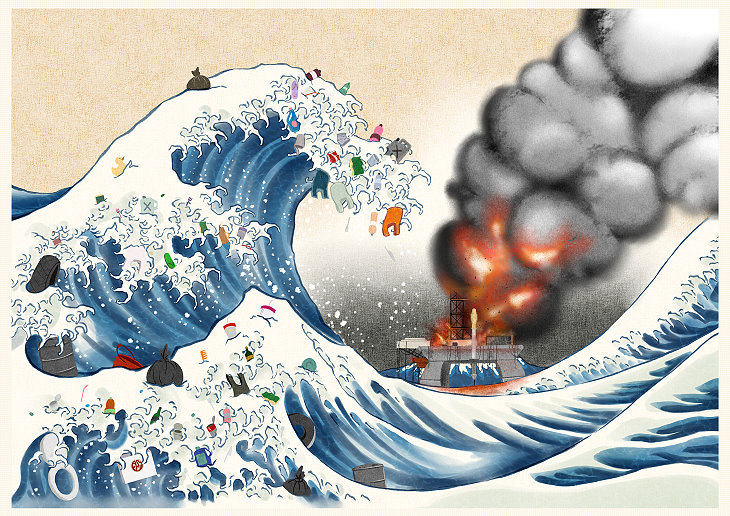
"La ragione per cui ho creato questa ilustrazione riguarda esattamente le relazioni tra l'uomo e il mare, una relazione che oggi non è più di mutuo rispetto. L'oceano ci ha sempre donato tanto e ora sembra che l'uomo non possa fare altro che chiedergli ancora e ancora, dandogli in cambio solo inquinamento e distruzione, di un ecosistema già fragile come quello marino. Ho scelto l'Onda di Hokusai come una delle più famose vedute del mare a livello mondiale, che però appare devastata dalle sconsiderate conseguenze della vita umana e da uno dei più tragici disastri dei tempi recenti, l'incendio della piattaforma Deepwater Horizon".
Il secondo Premio Leone del mare è andato a Paolo Bottoni di Roma, nella classe di età oltre 19 anni per la categoria testi. La sua Storia della Fontana di Trevi costruisce un nesso tra arte, ingegneria, il popolo, il mare e la terra. La fontana è visitata ogni anno da milioni di persone, che lanciano le loro monete come pegno per tornare a vedere questa meraviglia, ma pochi ne conoscono la storia. Quindi, cliccate nel link precedente per scoprire altre cose da conoscere e ammirare la fontana con occhio diverso durante la vostra prossima visita o vedendone foto. Per essere riconoscenti ai doni dell'oceano e agli artisti che creano opere reverenziali di ogni tipo, anche musicali.
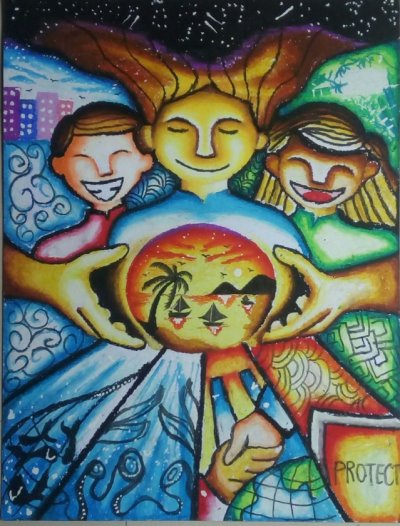 Siamo grati che Paolo Bottoni abbia devoluto il premio in denaro di 200€ al Centre Sikari de Mingo'o, una scuola creata dal gruppo della società civile Wopa. a 75 km dalla costa di Kribi, in Camerun. Il centro offre almeno alfabetizzazione e educazione numerica di base ai bambini pigmei, che non hanno accesso alle scuole pubbliche. Hanno avuto notizia del concorso Mundus maris Awards, ma non sono riusciti a partecipare per assoluta mancanza di mezzi. Grazie per questo gesto generoso. Il premio è stato inviato l'8 giugno. Ci auguriamo che tale solidarietà pratica trovi molti imitatori.
Siamo grati che Paolo Bottoni abbia devoluto il premio in denaro di 200€ al Centre Sikari de Mingo'o, una scuola creata dal gruppo della società civile Wopa. a 75 km dalla costa di Kribi, in Camerun. Il centro offre almeno alfabetizzazione e educazione numerica di base ai bambini pigmei, che non hanno accesso alle scuole pubbliche. Hanno avuto notizia del concorso Mundus maris Awards, ma non sono riusciti a partecipare per assoluta mancanza di mezzi. Grazie per questo gesto generoso. Il premio è stato inviato l'8 giugno. Ci auguriamo che tale solidarietà pratica trovi molti imitatori.
Joshua Garofil, 18 anni, da Los Baños, Filippine è stato premiato con il Turtle Prize per il messaggio positivo del suo disegno..
Ronnel Pamulaklakin Forte, 17 anni, anche lui di Los Baños, ha ugualmente vinto il Turtle Prize per il suo disegno più in basso.
La piccola Liza Britanie NJOKEP MALOUM, 8 anni, del Camerun, ha convinto la giuria con questa poesia
Océan Océan
Je suis si petite
Et toi océan
Immense tu es
Bleu tu es
Beau tu es
Unique tu es
Malheureusement pour toi
Ils te polluent sans penser à demain
Tes glaciers disparaissent chaque jour
Ta faune et ta flore ne vivront pas toujours
Mais quand tu manifestes ta colère
Tu deviens destructeur et meurtrier
Ah ! Océan, finalement tu es si mystérieux !
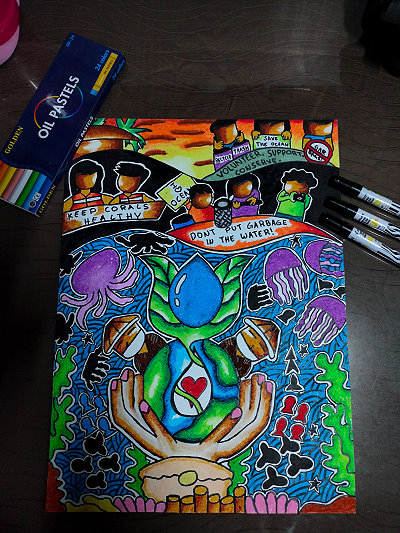 Trazuzione
Trazuzione
Oceano, Oceano
Son così piccola
E tu oceano
Come sei grande
Come sei blu
Come sei bello
Come sei unico
Come sei sfortunato.
Ti inquinano senza pensare al domani
I tuoi ghiacciai scompaiono ogni giorno
La tua flora e fauna non vivrà per sempre
Ma se mostri la rua ira
Divieni distruttore, uccisore
Ah! Oceano, sei infine così misterioso!
Quattro contributi video hanno anche vinto il Turtle Prize:
Valentina Ruiz-Leotaud, 37 anni, ha inviato un video sulla gestione della pesca a nome del progetto Sea Around Us
Il Capítulo de Geoético del Sur de Chile ha inviato due interessanti video. Il gruppo è composto da Nicolás Alonso Espinoza Tapia, Leandro César Ledezma Durán, Adriana Belén Rivera Murton, Fernando Nicolás Jacob Valenzuela Morales e il loro mentore, pProf. Sandor Mulsow della Universidad Austral de Chile. Cliccate sul link per vedere "Océano" and "Minería marina" sul canale YouTube di Mundus maris.
Il gruppo della Lagos State University ha offerto un raro pezzo per la protezione dell'oceano, "Aje Olokun " (Salute dell'oceano). I sei studenti e il loro mentore erano: Akanbi Adeyemi Micheal, Ogundimu Fatimoh, Nkwor Precious, Adenekan Obadare, Adigun Mercy, Olamide Agbe-Davies, e il dr. Hammed M.A.
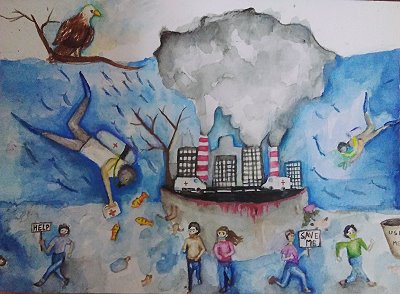 Gli Shark Prize vanno a Prince-Will Achu per il suo video sull'oceano e a Princess Flora Achu, 22 anni, per la sua short story sui ragazzi di Limb. sulla costa del Golfo di Guinea, entrambi di Yaoundé, Camerun.
Gli Shark Prize vanno a Prince-Will Achu per il suo video sull'oceano e a Princess Flora Achu, 22 anni, per la sua short story sui ragazzi di Limb. sulla costa del Golfo di Guinea, entrambi di Yaoundé, Camerun.
Samba e Kumba sono le mascotte di Mundus maris. La giuria ha assegnanto il premio di incoraggiamento Samba e Kumba ai seguenti autori:
Nel gruppo di età fino a 12 anni, Suvexa Banerjee, 11 anni, della scuola di Amanora, Pune, Maharashtra State, India, e Hélène Astride Ewono Onana, 12 anni, della Ecole bilingue l'Orchidée, Douala, Cameun hanno impressionato per le loro visuali artistiche.
Nel grupppo dai 13 ai 18 anni, il testo di Kelvin Momanyi, 16 anni, dal Kenya e la poesia di Yumi Perez, 12 anni, delle Filippine, hanno ricevuto il premio..
La lettera a Sua Maestà l'Oceano è stata scritta da Yumi Perez, Los Baños, Filippine.
Sei autori sono stai selezionati nel gruppo narrativa oltre 19 anni di età: quattro scritti in inglese:
Mia Cecilia Großmann, 19 anni, della Germania, per il suo testo intitolato "Our unquenchable hunger for more",
Jude Efetobor, 22 anni, e Irene Etta, 21 anni, entrambi del Federal College for Fisheries and Marine Technology in Victoria Island, Nigeria
Asha Mohammed, 21 anni, di Mombasa, Kenya, per il suo testo "The Kai",
e due testi in Francese
Juliette Nguedjio Njanang, 30 anni, di Yaoundé, Camerun, e volontaria di Bénévoles Océan, e
Magip Abdoul Samba, 41 anni, di Yoff, Sénégal e attivo nella Small-Scale Fisheries Academy.
Altre informazioni sui differenti eventi seguiranno a breve!
Transizione a Blue Justice con Too Big To Ignore
Come membro della comunità globale di ricerca riunita nella piattaforma "Too Big To Ignore", Mundus maris ha contributo all'evento focalizzato sulla Blue Justice organizzato già lunedì 7 giugno 2021.
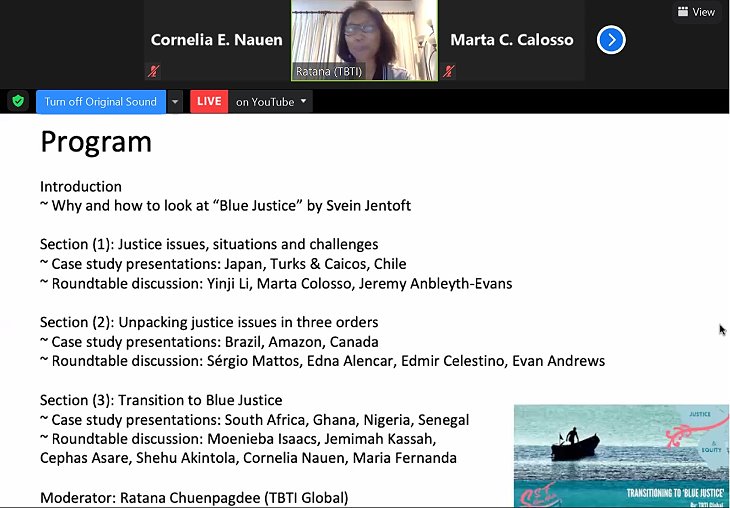
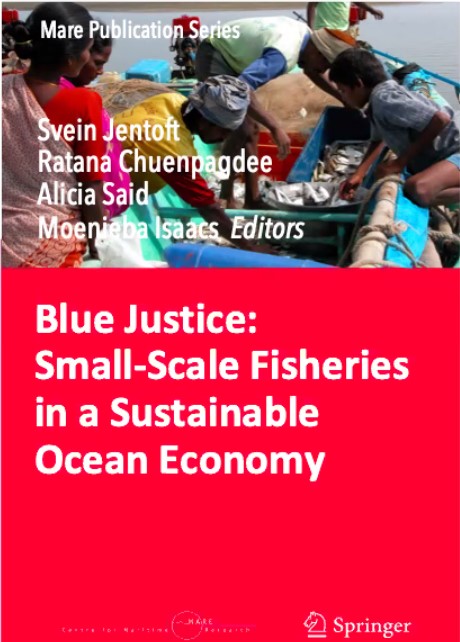 L'introduzione di Svein Jentoft ha preparato la scena e collocato i casi presentati nel contesto di tre ordinanze governative cruciali per garantire giustizia alla pesca su piccola scala in tutto il mondo.
L'introduzione di Svein Jentoft ha preparato la scena e collocato i casi presentati nel contesto di tre ordinanze governative cruciali per garantire giustizia alla pesca su piccola scala in tutto il mondo.
Tutti i singoli esempi sono stati presi dai capitoli di un libro di prossima pubblicazione "Blue Justice: Small-Scale Fisheries in a Sustainable Ocean Economy" che uscirà entro la fine dell'anno (vedi il facsimile a destra).
Purtroppo, molte di queste ingiustizie documentate hanno schiaffeggiato i pescatori su piccola scala in molte diverse parti del mondo, mettendo in dubbio gli ameni discorsi sulla Blue Economy. Mundus maris è stato quindi particolarmente felice di contribuire con un capitolo incentrato sulle possibili transizioni verso la giustizia e su come i metodi di potenziamento implementati attraverso l'Accademia della pesca artigianale possano contribuire ad affrontare questa sfida.
Nel loro capitolo, Cornelia E Nauen e Maria Fernanda Arraes Treffner spiegano l'approccio metodologico inclusivo. I suoi principi di base sono incentrati sulle persone e supportano la realizzazione della loro visione di cambiamento positivo. Hanno mostrato alcuni risultati concreti che donne e uomini di Yoff, in Senegal, hanno ottenuto grazie all'utilizzo dei metodi.
Per l'evento online, un video ha offerto un breve esempio di alcuni primi risultati. Durante la tavola rotonda, Cornelia e Maria Fernanda hanno insistito sul ruolo centrale della focalizzazione sulle persone e della partenza dalla loro visione del cambiamento, essensiale per loro come una bussola che guidasse tutte le fasi di implementazione.
Mundus maris è interessato a collaborare con altri gruppi, organizzazioni o progetti in differenti paesi per testare altrove questo approccio altrove, per esempio in un paese di lingua inglese, al fine di esplorarnee la scalabilità oltre il contesto locale in Senegal. Anche ulteriori collaborazioni in Senegal sarebbero molto benvenute, per allargare gli effetti positivi a tutti i partner.
Che bel modo di iniziare la World Ocean Week.
World Ocean Day in Apam, Ghana
Nell'ambito delle celebrazioni della Giornata Mondiale degli Oceani, l'8 giugno 2021, Mundus maris ha organizzato un dibattito di partecipazione e sensibilizzazione tra i pescatori e i giovani ad Apam, una comunità di pescatori nel distretto occidentale di Gomoa in Ghana. L'evento, a tema "The Ocean: Life and Livelihoods", mirava a un incremento di consapevolezza sulla connessione umana all'oceano, perché e come dobbiamo prenderci cura dell'oceano, con particolare enfasi sulla necessità di combattere l'inquinamento oceanico da plastica.
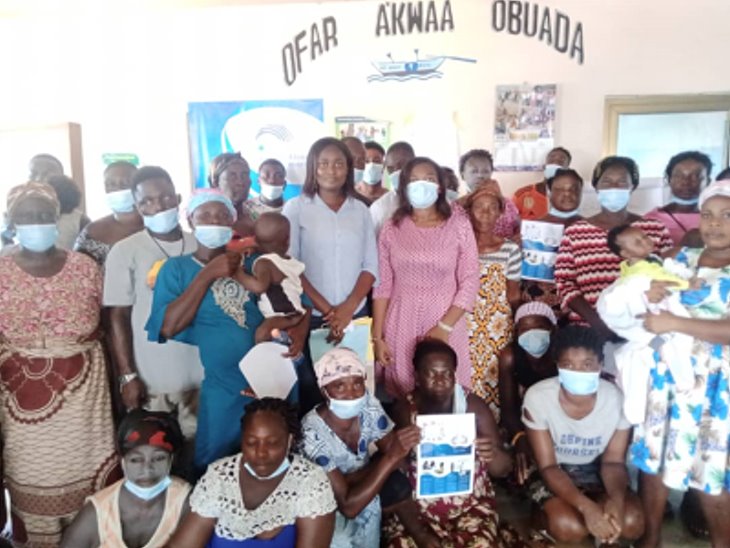
L'incontro, durato quasi due ore, ha visto la partecipazione di 57 partecipanti tra cui pescatori, donne lavoratrici e commercianti di pesce, giovani e altre parti interessate della comunità. È stato diretto dal prof. Francis K.E. Nunoo, uno scienziato della pesca e capo del Dipartimento di Scienze Marine e della Pesca dell'Università del Ghana, che ha guidato la discussione sul tema e ne ha fornito la sintesi, inclusi ulteriori punti salienti.
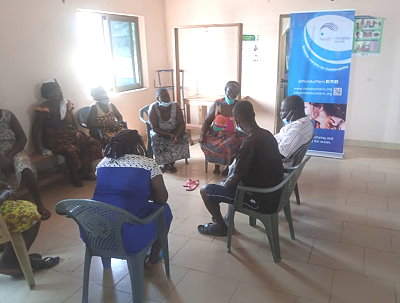
-
Qual è l'importanza dell'oceano per la vita e il sostentamento dell'uomo?
-
Cosa sta nadando male con l'oceano?
-
Come possiamo affrontare questi problemi per un oceano migliore?
Per quanto riguarda i benefici derivanti dall'oceano alle vite umane e ai mezzi di sussistenza, i partecipanti hanno evidenziato come ci fornisca pesce e altri alimenti, serva come mezzo di sostentamento, in particolare per loro gli abitanti delle coste, generi valuta estera dalle esportazioni di pesce, promuova il turismo e funga da luogo piacevole per la ricreazione (relax) e il benessere mentale. Riassumendo sull'argomento, il prof. Nunoo ha aggiunto come la vita umana dipenda dall'oceano evidenziando che l'oceano produce circa il 50% dell'ossigeno mondiale, regolando la concentrazione di ossigeno nell'atmosfera.
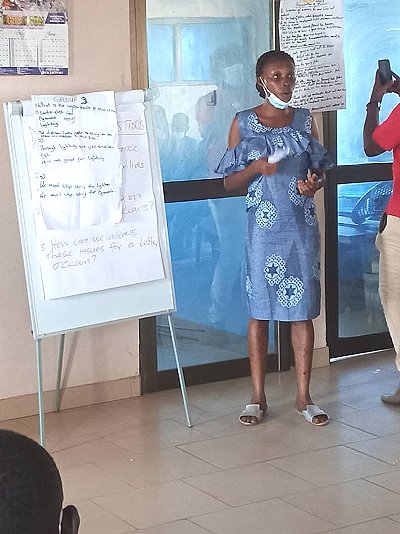
In una seconda sessione, a causa del recente disastro in Comunità che ha portato all'annegamento in mare di 12 bambini, il programma ha previsto una sensibilizzazione sui sistemi di sicurezza, da avviare sia a terra che in mare. Il sig. Isaac Anaman, responsabile distrettuale per l'estensione della pesca, Distretto Occidentale di Gomoa in Ghana, ha guidato la sessione sulle misure di sicurezza.
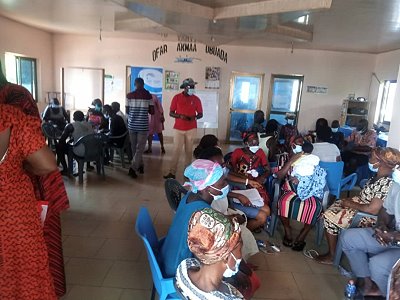
L'emittente locale Nyce FM ha onorato l'invito all'evento e ha mandato in onda il programma nel telegiornale serale dell'8 giugno.
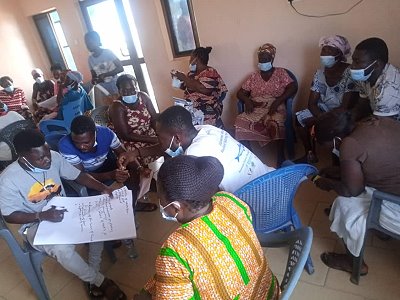 |
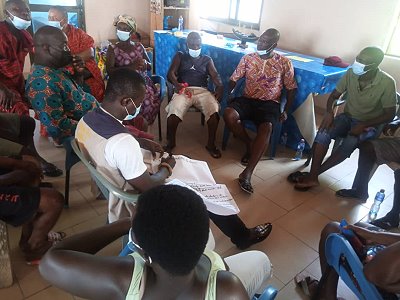 |
Testo e foto di Sarah Appiah e Yaa Osei Mensah.
Never shy to face any type of challenge, the Mundus maris group in Lagos led by Prof. Stella Williams and Ayojesutomi Abiodun-Solanke welcomed their online guests in zoomlandia - weathering the pouring rain and the continuing pandemic. Members and friends made their appearance and contributed to the programme with their presentations, remarks, questions and answers. The programme was scheduled like this:
1. Welcome Address by Dr Lydia Adeleke, Mundus maris, Akure, Ondo State
2. Opening Remarks by:
a. Dr. Cornelia Nauen, President, Mundus maris asbl (Germany);
b. Dr. Maria del Carmen Patricia Morales, Vice President of Mundus maris asbl (Leuven, Belgium)
c. Dr. Marcelo Morales Yokobori, Vice President, Latin America (Argentina)
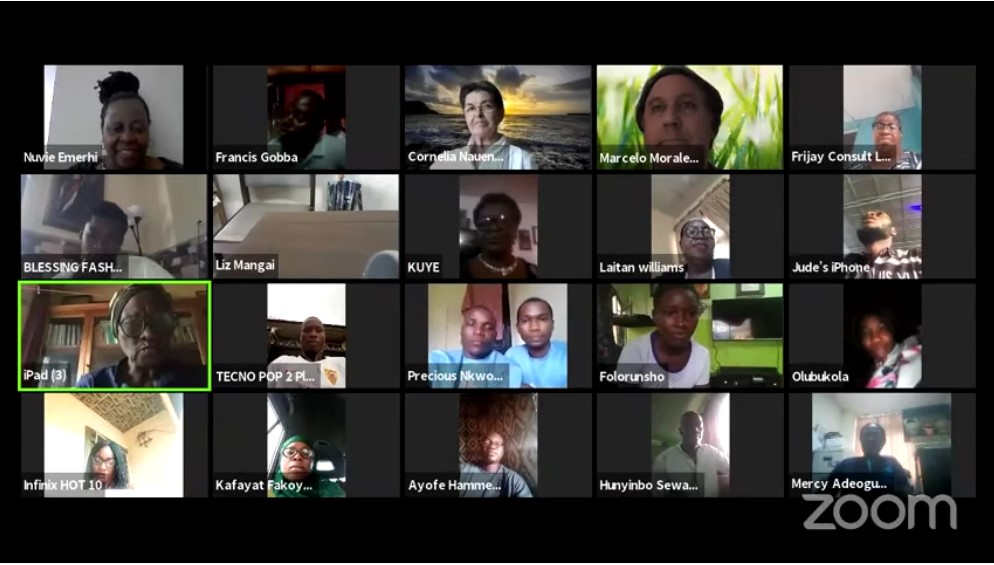
3. Why does Mundus maris celebrate World Ocean Day by Mrs Elizabeth Mangai, Lecturer, Federal College of Fisheries and Marine Technology, Lagos
4. 2021 UN Theme for World Ocean Day is "The Ocean: Life and Livelihoods".
-
Dr Mercy Adeogun, Head of Department, Federal College of Fisheries and Marine Technology, Victoria Island, Lagos, speaking on extension work
-
Dr Kafayat Fakoya, Lecturer, Lagos State University, speaking on small-scale fisheries
-
Dr Ebinimi Ansa, Researcher, Nigerian Institute of Oceanography and Marine Research, Aluu, Port Harcourt, Rivers State speaking on Oceanography and Aquaculture
5. Video on the small-scale fisheries academy in Yoff, Senegal, by Maria Fernanda Arraes Treffner for Mundus maris
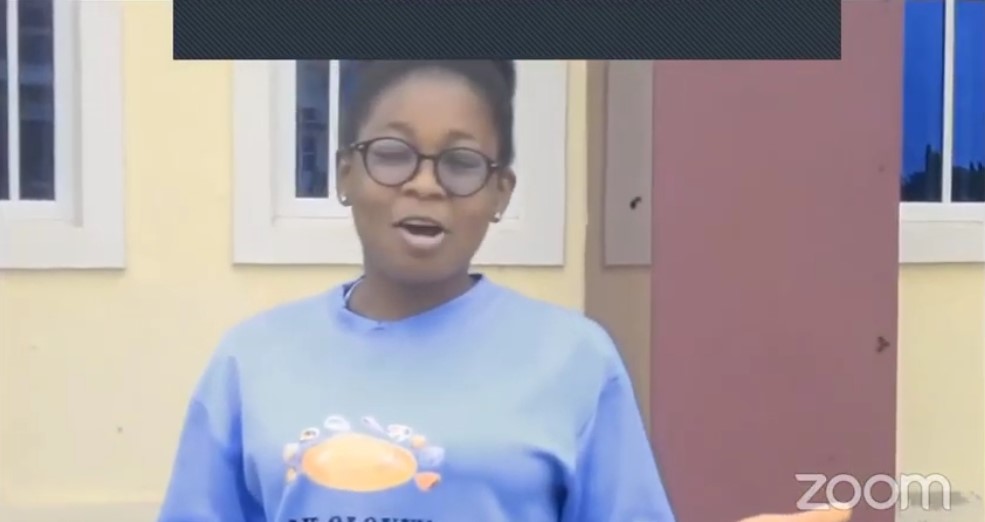
Still of the video of Lagos State University winning a Turtle Prize
6. Video by Lagos State University Team titled: Aje Olokun (Ocean Wealth) submitted to Mundus maris Awards 2021 and winning a Turtle Prize:
Akanbi Adeyemi (Age – 21);
OgundimuFatimoh (19);
Nkwor Precious (21);
AdenekanObadare (20);
Adigun Mercy (20) and
Olamide Agbe-Davie (19);
Coach/Coordinating Lecturer is Dr. Hammed M. A
7. Presentation of submissions to Mundus maris Awards 2021 by Prof Stella Williams, Vice President, Mundus maris asbl, titled: Connect with Mundus maris and peer into the work of the International Jury for World Ocean Day - with special congrats to the winning participants from Nigeria.
8. Q&A and Vote of Thanks by Ayojesutomi Abiodun-Solanke, Lecturer, Federal College of Fisheries and Marine Technology, Lagos
The event was streamed on YouTube.
The Grand Batanga public school had the privilege of receiving the delegation of Ocean Volunteers of Cameroon (Bénévoles océan) led by Jeauberte Djamou, who came to Kribi for the celebration of World Ocean Day on June 08, 2021. The stage was set before 10am. The current health instructions required the various participants to strictly observe the safety measures, in particular wearing protective face masks offered by the Volunteers to all participants.

The mayor of Kribi participated in person and was greeted by a welcome song. The choir also specifically expressed gratitude for sponsorship by Mundus maris wishing the team health and success in their work for international solidarity. The director of the Grand Batanga school welcomed the school inspector, the mayor and all guests of honour.
The mayor payed particular tribute to the Ocean Volunteers and their partners. She also exhorted the children to ensure more participation in Mundus maris Awards next year as high performers could obtain significant amounts of prize moneys.
As part of the programme and in addition to speeches by the guests of honour some pupils performed the fishermen's dance (see picture below).
Educational games were played to promote ocean protection.
The centre piece of the day was, of course, the hand-over of the honorary diplomas for participation and the prizes for the winners.
The top honour at the Grand Batanga school went to Liza Britanie, 8 years, whom the international jury of the Mundus maris Awards had selected for a Turtle Prize.
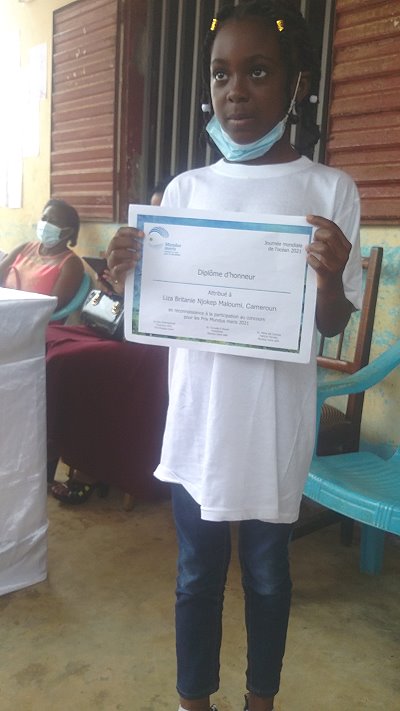 She proudly posed with her diploma.
She proudly posed with her diploma.
In her closing remarks the school inspector reminded the audience how Jeauberte Djamou had made her do the annual Mundus maris ocean quiz two years ago.
After doing her work for many years in Kribi, feeling the closeness of the sea and the connection, the constant reminders and pleas had at last alerted her more clearly to the importance of ocean protection and World Ocean Day celebrations. She went on to say:
"It does indeed have its place, as long as we see our environment being destroyed, our children must be sensitized. I also appreciate the Mundus maris Prize contest which is launched every year and which gives our children a voice.
This year we passed the information, but not all the schools responded on time. Next year I will do more so that we can have several winners in Kribi and that the celebration is extended to several more schools."
In closing the Ocean Volunteers thanked their various partners and reminded everybody that the ocean.
• Produces about 50% of the global oxygen and stores 50 times more carbon than the atmosphere.
• Covers about 70% of the earth's surface and carries heat from the equator to the poles, thus regulating our climate and weather phenomena.
• Is a valuable source of leisure for humankind.
• Provides more than just seafood.
• Provides seafood as a source of protein and nutrition to more than 3 billion people.
• Provides a vital source of livelihood. The ocean is the source of millions of jobs in the fishing, transport and tourism sectors.
• Contains various medicinal substances, some of which may help fight cancer, osteoarthritis, Alzheimer's disease and heart ailments.
• Is an important player in world trade through maritime transport.
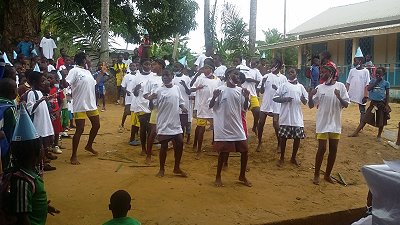
Pupils performing the fishermen's dance |
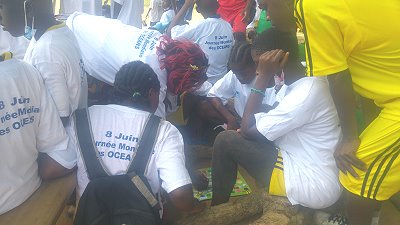
Playing educational games to stir up curiosity for the ocean |
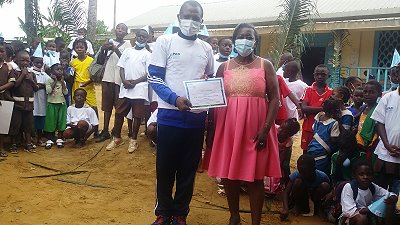
Honorary diploma for participation handed by the school inspector to the director (left) |
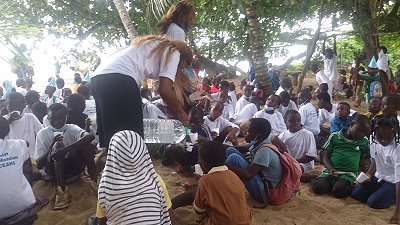
Refreshments in the shade distributed by Jeauberte Djamou with the pupils taking advantage of the ocean view |
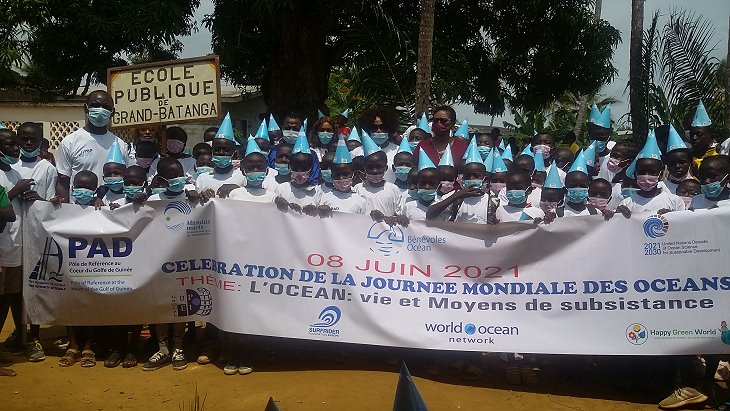
Photos by Jeauberte Djamou.
For this year’s World Ocean Day, Eco-Ethics Kenya teamed up with a host of other ocean stakeholders. More than 13 officials drawn from government, civil society and private sector assisted to organise the celebrations. Since April 9, the officials held meetings at Kenya Coast Tourist offices in Mombasa culminating to a colourful World Ocean Day celebration on eighth of June.
This year’s theme - The Ocean: Life and Livelihoods - guided the day’s activities. The Covid-19 restrictions imposed by the Kenyan government restricted the celebrations to 50 people, when we would gather hundreds in earlier occasions.
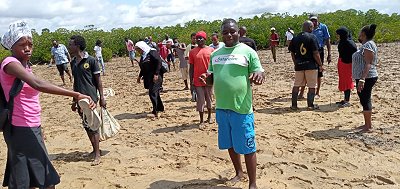
Kidongo Beach outing to plant mangroves |
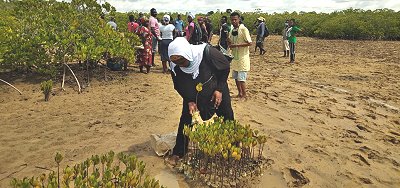
Planting 5000 seedlings at Kidongo Beach |
As usual, we also planned two pre-WOD activities. The most common one is prepping the young stars of our Eco-Clubs to participate in an international essay and art contest for Mundus maris Awards. This year, Eco-Ethics was among the partners of the Belgium based Mundus maris organisation. Sixteen students participated and two students impressed the International Jury bagging a cash award of €30 each. All participants got an honorary diploma for their active support for ocean awareness and protection.
The other pre-activity was a mangrove planting exercise at Kidongo Beach along Mtwapa Creek. The exercise coincided with the World Environment Day marked on 5th June. Remarkably, 50 participants helped in planting a record 5,000 mangrove seedlings. Mombasa County Director of Environment from the National Environment Management Authority (NEMA), who was the chief guest, graced the occasion.
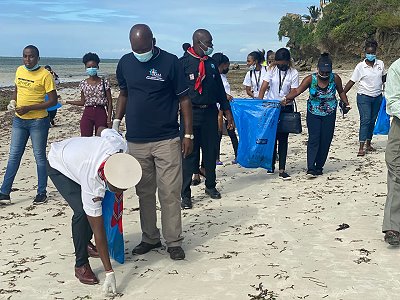 “We need to partner and collaborate in a bid to conserve our oceans and environment even as we enter the UN decade on Ecosystem Restoration. This is a rallying call for the protection and revival of ecosystems all around the world, for the benefit of people and nature,” said the Director, Mr. Lopokoiyit.
“We need to partner and collaborate in a bid to conserve our oceans and environment even as we enter the UN decade on Ecosystem Restoration. This is a rallying call for the protection and revival of ecosystems all around the world, for the benefit of people and nature,” said the Director, Mr. Lopokoiyit.
Meanwhile, the ban on public gatherings coaxed the planning committee to get creative. The gist of such an international day is to disseminate as much information on ocean ecosystems to a wide population and to combine awareness raising with action. This is why we organised a beach clean up in partnership with Mombasa Beach Management Unit and joint press briefing of all ocean stakeholders in Mombasa County.
And that worked as more than 15 national and regional media houses turned up. Together, they reach over a million people. In fact, this was one of the most publicised World Ocean Day celebrations ever since we started.
Members of the Planning Committee who addressed the media included Mercy Mghanga, an Executive Member of Beach Management Unions Association, Kenya, and Syria Karisa, a Research Officer at Kenya Wildlife Service. Others include the Director of Environment at NEMA Office in Mombasa, Mr. Lopokoiyit, and a representative from the Directorate of Marine Environment, Kenya Maritime Authority (KMA).
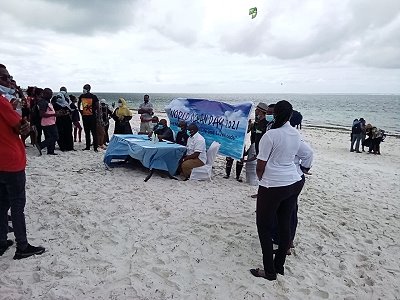 |
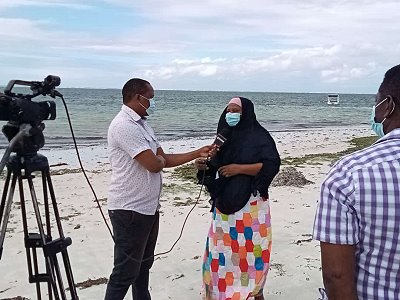 |
The press briefing was live on three national TV channels: Citizen, TV 47 and KTN, including a slot in prime-time bulletins for the day.
Three organisations set up special exhibitions for the occasion: Spire Life Saving Limited active in water sports, the National Museums of Kenya sharing insights on underwater archeology, and Morganics Company displaying how they manufacture fertilizer from seaweeds.
The day’s success was a testament to how collaboration among ocean economy stakeholders can help catalyse the ambition towards a healthy and sustainable ocean. The significant financial and moral support received from Mundus maris also made the day feel international and most importantly, a humbling moment for us as the World Ocean Day Planning Committee in Mombasa. We say, thank you for the edifying cooperation!
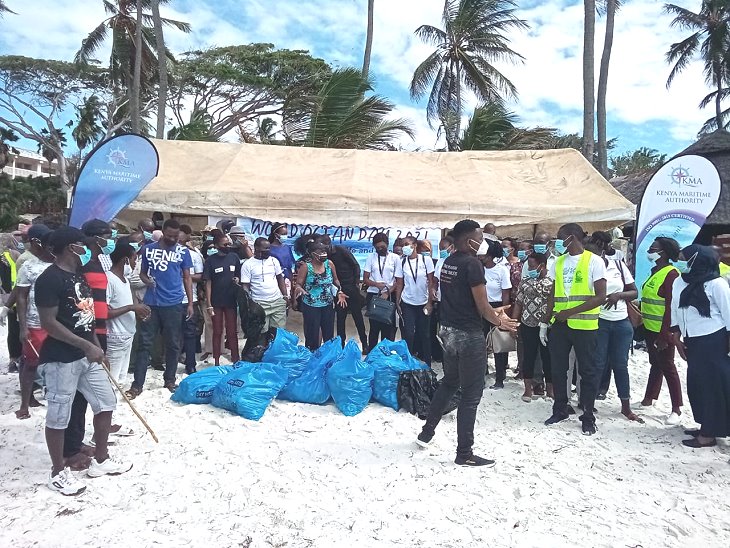
Photos by Brian Gicheru.
La partecipazione della Associazione delle scuole di calcio di Hann Bel Air
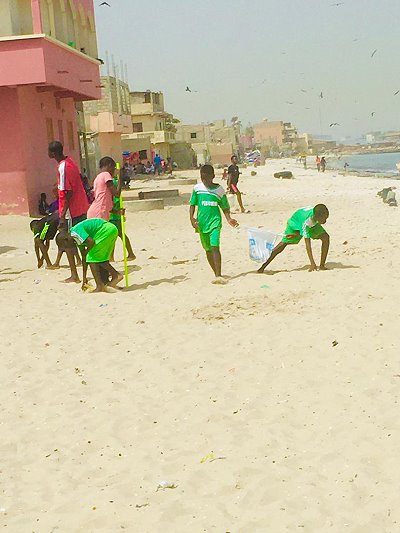 Come nelle precedenti edizioni della Giornata Mondiale del Oceano, la comunità sportiva l’ha celebrato, attraverso l'Associazione delle scuole di calcio, che conta 12 centri. Durante la giornata sono state svolte due attività. La prima consisteva nel mobilitare i gestori dei centri di formazione ei giovani in formazione per la pulizia della spiaggia. Visto lo stato di degrado della spiaggia, divenuta inquinata a causa dei rifiuti solidi dei residenti locali, ma anche dei rifiuti industriali e degli scarichi del porto, l'iniziativa mobilita, oltre ai membri dei centri, alcuni giovani volontari locali. Come negli anni precedenti, questo investimento umano era previsto per la mattinata. La pulizia della spiaggia mira a superare la sensazione di impotenza di fronte all'inquinamento che ha notevolmente degradato l'ambiente di vita, ma anche a mostrare come la manutenzione della spiaggia sia in più un mezzo attraverso il quale si può promuovere lo sport, in generale e il calcio in particolare.
Come nelle precedenti edizioni della Giornata Mondiale del Oceano, la comunità sportiva l’ha celebrato, attraverso l'Associazione delle scuole di calcio, che conta 12 centri. Durante la giornata sono state svolte due attività. La prima consisteva nel mobilitare i gestori dei centri di formazione ei giovani in formazione per la pulizia della spiaggia. Visto lo stato di degrado della spiaggia, divenuta inquinata a causa dei rifiuti solidi dei residenti locali, ma anche dei rifiuti industriali e degli scarichi del porto, l'iniziativa mobilita, oltre ai membri dei centri, alcuni giovani volontari locali. Come negli anni precedenti, questo investimento umano era previsto per la mattinata. La pulizia della spiaggia mira a superare la sensazione di impotenza di fronte all'inquinamento che ha notevolmente degradato l'ambiente di vita, ma anche a mostrare come la manutenzione della spiaggia sia in più un mezzo attraverso il quale si può promuovere lo sport, in generale e il calcio in particolare.
Nel pomeriggio, infatti, che era la seconda attività, è stato organizzato un torneo di calcio. Al di là della sua natura agonistica, il torneo di calcio ha un significato educativo. È un modo per mostrare ai praticanti di questo sport molto popolare in Senegal, che mantenendo una spiaggia pulita, possiamo avere un parco giochi. Va ricordato che il comune di Hann Bel Air ha molte vecchie glorie che sono state selezionate in nazionale, grazie a questa spiaggia. Qui è dove hanno svolto il loro apprendistato che le ha offerto molto. Quindi, oggi la spiaggia è molto ridotta a causa dell'erosione da un lato e dell'avanzata dell'urbanizzazione con costruzioni ad uso residenziale che hanno conosciuto uno sviluppo senza precedenti. Tornando al torneo di calcio, le 10 squadre in gara erano:
Maison Foot, Hann Bel Air Selection, Challenge, Hann Bel Air Development Center, Friendship Club, Gouneye Mafall, Top 11, Vision Fpot, Gouneye Hann Montagne 6 e Mame Rokhaya. Il torneo si è svolto in due categorie: i grandi e i piccoli, chiamati i rioni a soli 12 anni. La squadra del Center Maison Foot ha vinto tra i big, mentre per i piccoli la fortuna è stata dalla parte del Challenge Foot. La ricompensa offerta da Mundus maris consisteva in 8 palloni da calcio e due coppe.
La regolarità dimostrata dall'Amicale nel celebrare ogni anno la Giornata Mondiale del Oceano in collaborazione con Mundus maris è merito dell'impegno e delle modalità volontarie dell'ufficio di questo Amicale, attivo su scala del Comune di Hann Bel Air. In particolare gli instancabili sforzi di Babacar Ciss, meglio noto come Gabou, ci contano per questo. Lui è il responsabile del Centre Ecole Foot, membro dell'ufficio dell'Amicale e che è anche il nostro interlocutore privilegiato con la comunità sportiva. L'impegno di questi soci si è riflesso anche nel fatto che in questa occasione si sono fatti carico di tutte le attrezzature necessarie per la pulizia della spiaggia.
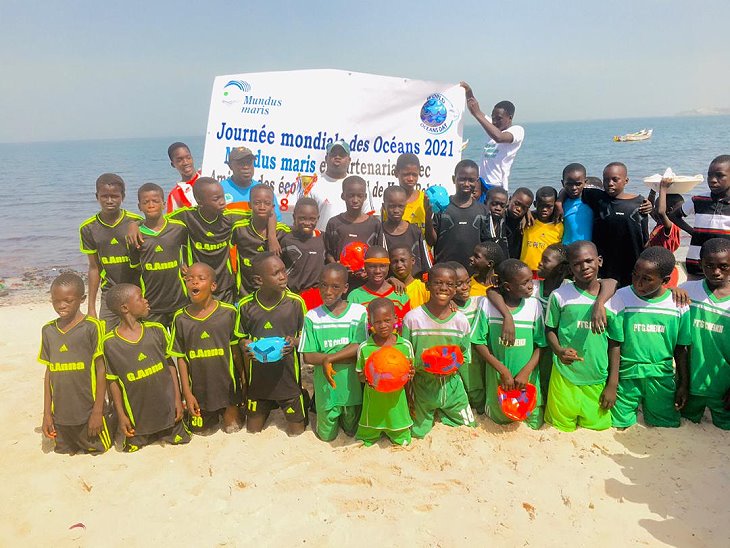
The ecosystem approach to fisheries (EAF) in its links with food security in the spotlight
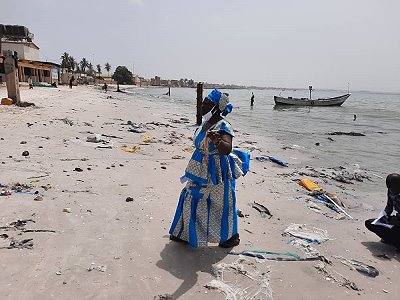
Madame Mané in awe of the garbage on the beach
The Hann Montagne school has opted for the 2021 edition of World Oceans Day (WOD) for an excursion for students aged between 11 and 12 years of age, on June 9, 2021, to the artisanal fishing landing site in Hann with the ruler showing the minimum sizes of sexual maturity of the main commercial fish species. This choice is inspired by the teaching kit developed by Mundus maris with and for the FAO EAF Nansen Programme, an initiative in which schools in Hann had participated.
The idea for an educational outing using the fish ruler was chosen by the teaching staff during a preparatory meeting at the school, 25 May 2021, with Aliou Sall chaired by the director, Ms Sané. The main reason is linked to the issue of food security becoming an issue in the community.
Indeed, Mr. Ndiaye - having already participated in a seminar to upgrade teachers on the ecosystem approach to fisheries at the initiative of Mundus maris - underlined the importance for young students, the overwhelming majority of whom come from fishing families.
In the current fishing context, the marketing of juveniles is frequently observed in small markets at the street corners in the community. Thus repercussions on the future of the resource and food security are to be feared. The director had underlined that failure to respect the minimum size has a direct impact on the increase in the price of fish that have become rarer and that is already felt in the "housewife's basket".
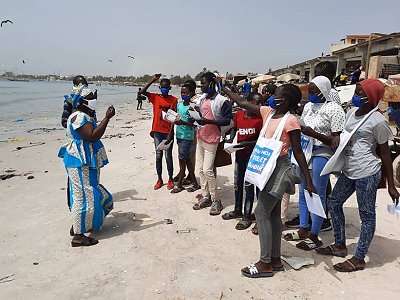
Ms. Mané and Mr. Ndiaye question the students on the beach, beach of Hann Bay
The excursion was organised with around ten students, half of them girls and boys. The pedagogical framing was ensured by Ms. Mané and Mr. Ndiaye, their school teachers, and Aliou Sall from Mundus maris as an expert accompanied by Mr. Souleymane Sow, volunteer of Mundus maris.
Supervised by the two teachers, the students had equipped themselves with the fish ruler and each with a notebook and a pen for the purpose of reporting back in class to the teachers and other students.
At first, as soon as the students arrived on the fish landing place, they were imrpessed - as were the two teachers - by the dirty condition of the beach, with plastic waste thrown back by the sea and garbage from households bordering the Bay of Hann.
This is how an observation course was improvised right on the beach. On the basis of questions and answers, for an hour and a half Mr. Ndiaye and Ms. Mané brilliantlyanimated this session. As the images taken during this observation session illustrate, the students took a lot of notes which were then reported back to class.
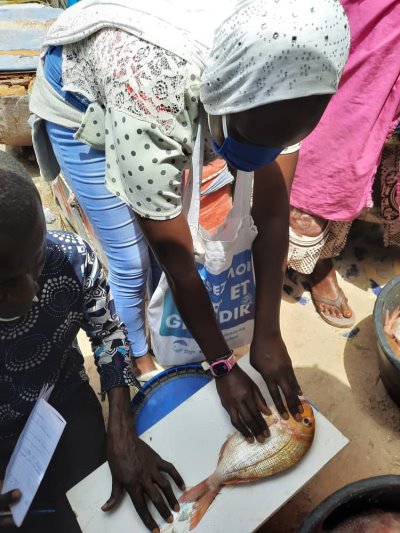
Measurement of a sea bream, found to be a good size
Thanks to the approach of the two teachers, this session allowed the students to realize that there are several factors behind the pollution of the ocean and coastal areas and the resulting impacts. Indeed this is the first opportunity that was offered to these students to understand that the responsibilities must be shared between the political decision makers at the national level, the local elected officials in charge of the living environment in the municipality in charge of their school, but also the residents who contribute significantly to the pollution of the bay. They thus realized that ocean pollution has very negative impacts on public health.
They were also able to understand the link with food security, because if fish habitats are polluted, there are fewer fish and the living conditions of people who depend on fishing experience a decline in their income, especially as the resources are already in an overfished condition. These multiple sources of stress on the fish resources and their ecosystems are felt everywhere.
It was at the end of this first exercise that the fish measurement session started at the stalls of the fishmongers found on the spot and who showed an excellent spirit of cooperation.
The measurement session was preceded by a presentation of the reasons for the trip by Aliou Sall for the wholesalers. He took the opportunity to tell them about World Oceans Day, its merits and the theme of the 2021 edition "The Ocean: Life and Livelihoods". He also explained in detail the meaning of the fish ruler and what is meant by the minimum length of sexual maturity.
The wholesalers with whom the excursion team worked expressed great curiosity about the fish ruler they had only just discovered during the session. They were all the more impressed - but above all surprised - to hear what the size of sexual maturity means and especially understand the negative impact on the availability of the resource if these minimum sizes are not respected. That certainly fostered their interest and their collaboration, thus contributing to the success of the field trip.
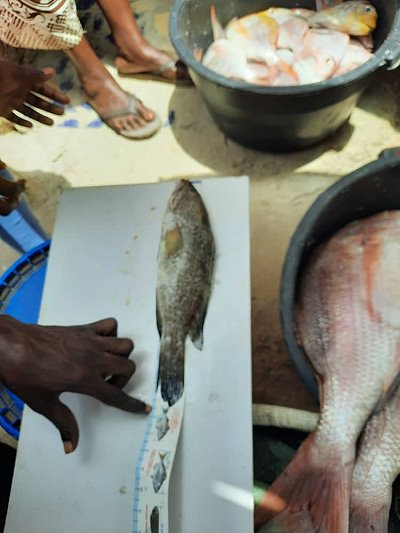
Measurement of a miserable white grouper of approximately 30 cm which should have measured at least 60 cm!
The students thus proceeded to measure the different species found that day on the landing site, in particular grouper, sea bream and sardinella. While awaiting the students' report in collaboration with their teachers, the main lessons learned from this outing dedicated to the ecosystem approach to fisheries are as follows
(i) the juvenile groupers dominate by far the marketed quantities (for this emblematic species in Senegal). The sizes rarely exceeded 25 cm while the mimimum size of a white grouper ('thiof' in Wolof, Epinephelus aeneus) is around 60 cm total length!
(ii) the sea breams found in the landing area were all of good sizes beyond minimal length. They were fished in Mauritanaian waters and landed in Hann transiting through Saint Louis in the north of Senegal.
(iii) the round sardinellas (Sardinella aurita) had achieved the minimum total length of about 20 to 23 cm, but the men and women fishmongers cautioned that in living memory this was the worst fishing season. They noted that the sardinella season had started too late and lasted for at best three months instead of seven to eight months!
It should also be noted that in the review meeting afterwards and in the light of the rich lessons learned from the excursion, the teaching staff, under the supervision of the director, expressed the need for a sustained partnership with Mundus maris. This would not only consolidate the achievements, but also allow the school to develop this initiative further given that the students mainly come from fishing families.
Some proposals have already been outlined in the perspectives of such a more continuous collaboration. They will be better structured in order to be able to share them with Mundus maris.
But in the meantime, the school would like to have a set of fish rulers for the students and any other support materials that can help them to continue working on the ecosystem approach to fisheries.
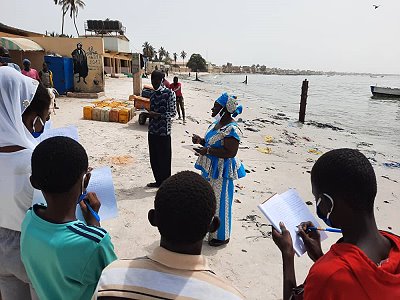 |
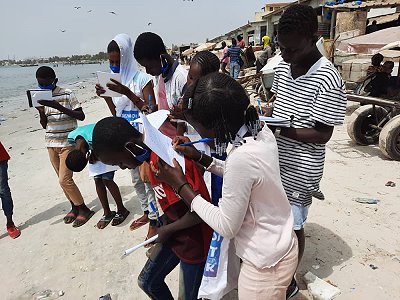 |
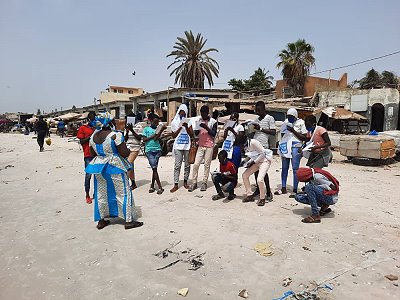 |
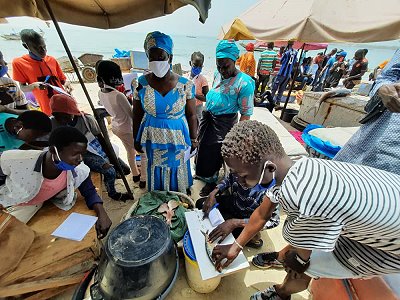 |
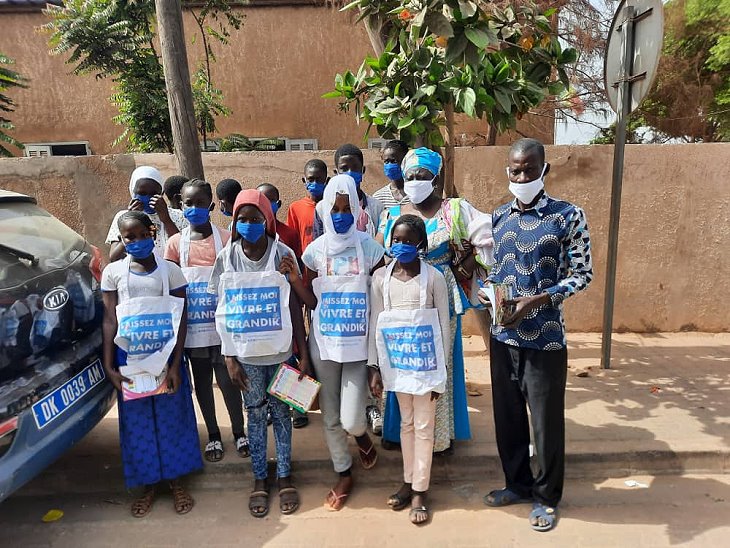
Text and photos by Aliou Sall
The Kawabata Yasunari Primary School in Hann, which has been collaborating for several years with Mundus maris on the occasion of World Oceans Day (WOD), celebrated the 2021 edition by organising a sketch under the artistic direction of Bina Diop, artist actor and key resource person of the Mundus maris team from Senegal. The choice to celebrate the occasion with a focus on artistic expression was proposed and validated by the school leadership during a preparatory meeting held on May 25 between Aliou Sall and the school director, Madame Diouf, in the presence of some members of the teaching staff and Bina Diop.
The piece presented was rehearsed with the student actors a few weeks before the World Ocean Day celebration. Bina has indeed developed a script based on the inspirational text of the 2021 edition the theme of which is "The Ocean: Life and livelihoods". This is the sequel to several plays on ocean pollution and its effects that have been performed with school children in Hann on previous World Ocean Days. But this year's theme was added value for the sketch produced in 2021.
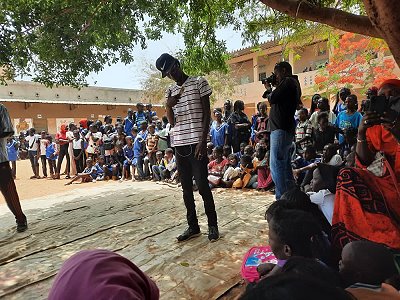
Bina Diop in full swing animating the event
Indeed, the play has sensitized an exceptional audience - by its size - on the dangers of pollution for the health of the ocean. Also thanks to the artistic ingenuity of Bina and the preparation which had taken place, it sensitized the school community primarily on the following aspects:
-
The impact of ocean pollution on the living conditions of the people depending particularly strongly on healthy ecosystems for their daily lives;
-
The incivism of those people who bear a large part of responsibility for the poor state of health of an ecosystem of the importance of the coastal zone of the ocean;
-
The impérative need to adopt a civic behaviour, to show civility and to accept the share of responsibility of each and everyone, individually speaking, in order to preserve the state of health of the ocean: populations, political decision-makers at the national level, local elected officials in charge of the management of municipalities, companies.
The performance was not limited to the sketch. Indeed it was a lively theatre piece with songs composed for the occasion, all intended to provoke an awakening of consciousness on the part of the audience.
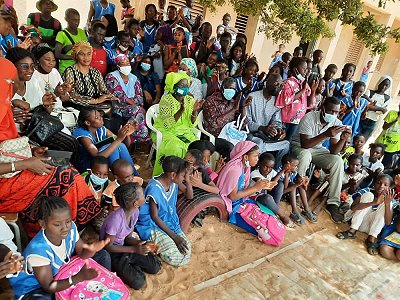
The audience applauded enthusiastically
We draw some lessons from this exceptional event compared to those that took place in this same partner school in earlier occasions:
Mundus maris, through the person of Madame Diouf, the director, can count on a very committed team eager to develop a more formal and more continuous collaboration. This is what the director said while speaking at the end of the sketch, thanking our team and thus underlining once again their great availability already demonstrated during the preparation phase.
There was an exceptional mobilisation of all the school's teaching staff, who came to watch the performance. For the first time,, all the teaching staff left the class rooms to celebrate World Ocean Day in the presence also of some parents of students who had the time to participate.
It was after the presentation of the play that Aliou Sall was invited to deliver the closing remarks. During his address, Mr Sall expressed the immeasurable satisfaction felt this year after all the time since Mundus Maris he represents started working with this school. He gave the assurance for the future collaboration with the noted commitment of the side of the director and teachers. Some of the teachers have been involved for some years already. On behalf of Mundus maris he presented a book on the ocean to Madame Diouf as a symbolic response for all the great work she has done with her team for this 2021 WOD edition.
Photos M. Souleymane Sow.
The new memorandum of cooperation between Mundus maris asbl and Belgrano University in Buenos Aires, Argentina, was put into practice again in the occasion of World Ocean Day. Thanks to the tireless efforts of Dr Marcelo Lino Morales Yokobori, a webinar was organised in two sections, one focussing on the thorny issue of illegal, unrecorded and unregulated (IUU) fishing, the other on biodiversity and marine conservation.
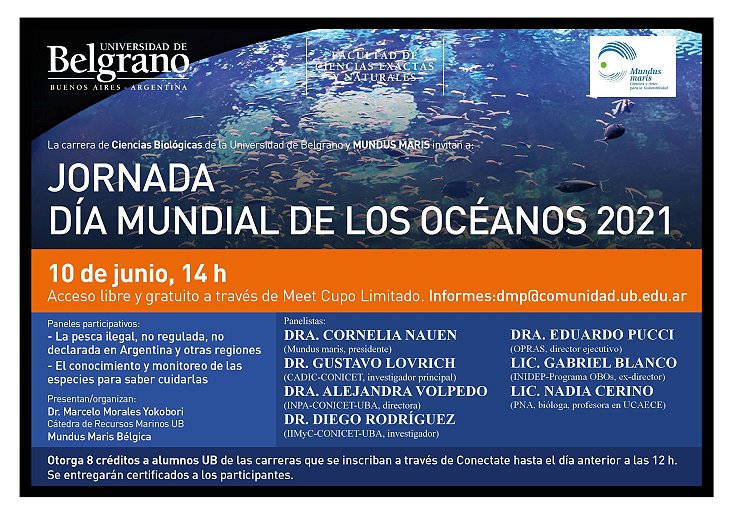
More than one hundred participants followed the interesting presentations and interacted with the presenters and organisers.
Cornelia E Nauen of Mundus maris opened the round of IUU panel by defining the terms and illustrating the seriousness of the issue. This has kept FAO and its member states on the alert since the beginning of the new millennium. Fighting the scourge requires new levels of cooperation between national and international authorities and agencies at several levels. Phasing out harmful subsidies to long-distance fleets, long overdue after 20 years of negotiations in the World Trade Organization (WTO) is among the necessary measures. The resulting overfishing is one of the greatest threats to the ocean and jeopardizes the health, food security, and livelihoods of millions of people in coastal communities who depend on healthy, sustainable fisheries. Other crucial measures are to prohibit transhipment at sea and raise awareness among citizens that IUU fishing is a criminal offence often associated with other crimes, such as human rights abuses, arms and drug running and thus bringing much harm to people and planet. The slides (in Spanish) are here.
Eduardo Pucci of the Argentinean shipowner association for sustainable fishing in the South Atlantic (OPRAS) placed the attention on the operation of massive fleets of several hundred vessels appearing since a few years along Latin American Exclusive Economic Zones (EEZ) during the fishing seasons for squid and other resources. Nominally operating on the high seas and not in formal infraction of international rules, the sheer catching power of these fleets, not bound by any rules and suspected to often trespas into EEZs after turning off the VHS signals pulled the rug under any attempts of national and regional fisheries management authorities to maintain resources in a healthy state and sustainable.
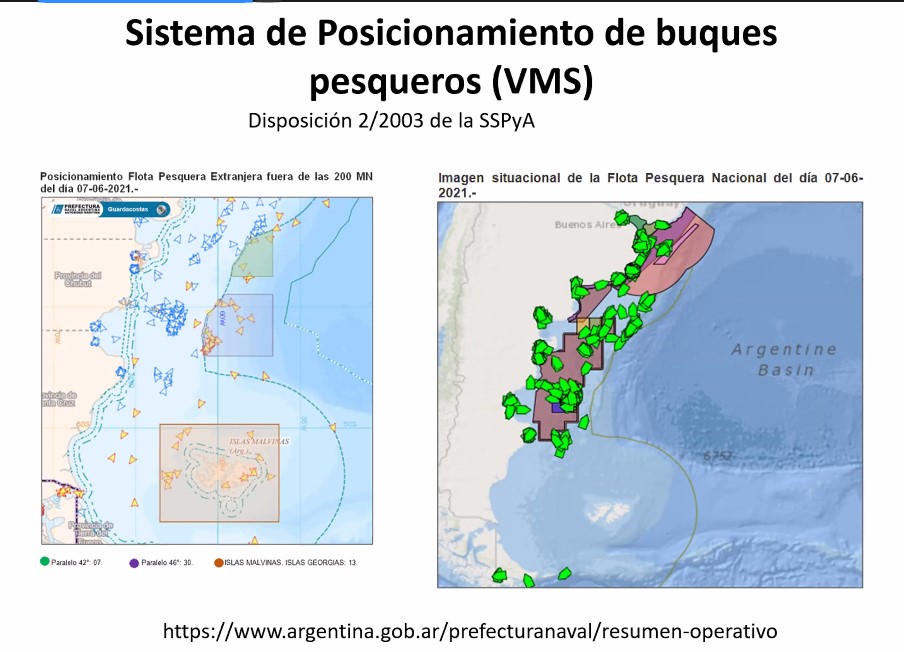
Gabriel Blanco showed, among others, the geographical distribution of the national and international fleets based on VHS signals
Gabriel Blanco shared insights from his long involvement with observer programmes at sea.
The entire topic drew lots of interest and questions as Argentina is very directly suffering from IUU fishing and incursions of armadas of mostly Asian fleets as we reported repeatedly on our social media. The recording of the panel session is available here.
The second panel on biodiversity was different but equally attractive as speakers made their key points in very captivating ways. Alejandra Volpedo, from Universidad de Buenos Aires, showed the immense diversity of cartilaginous and bony fishes in the Southwest Atlantic waters. She also emphasized the importance of working in interdisciplinary teams and in international cooperation. You can check the fish out in FishBase. She strongly encouraged the students to pursue their dreams and to continue with commitment in their studies. She yielded lots of grateful text messages. She closed her presentation with a painting of Joaquín Sorolla, Running along the beach, and words of Julio Cortazar.
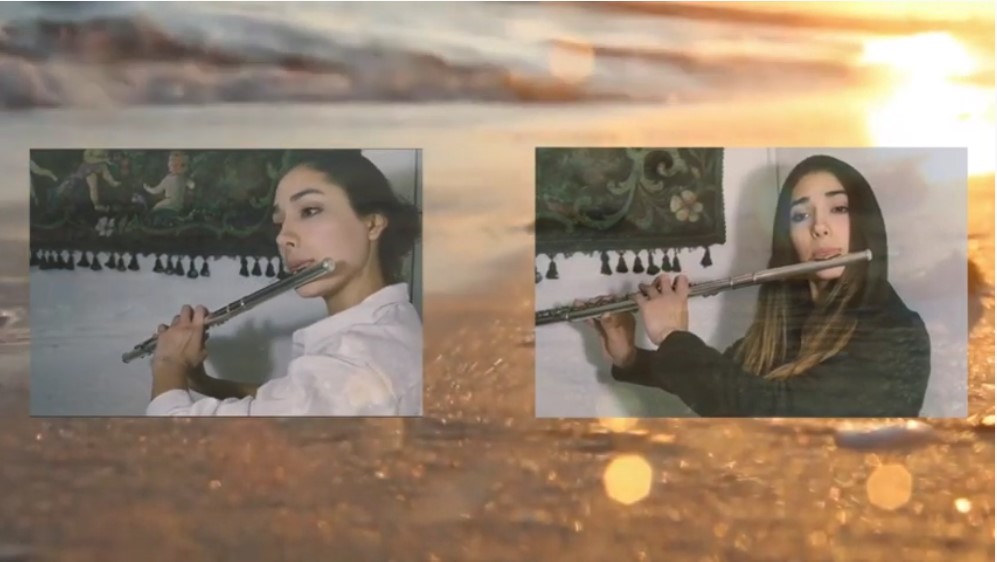
This offered the moderator an opportunity to introduce Patricia Morales of Mundus maris. She in turn introduced Clara Ackermann and her Orquesta Juvenil de San Telmo, the musicians who prepared two videos for this year's Mundus maris World Ocean Day celebrations: one is a Letter from the ocean to the humans and the other is the Response from the humans to the ocean.
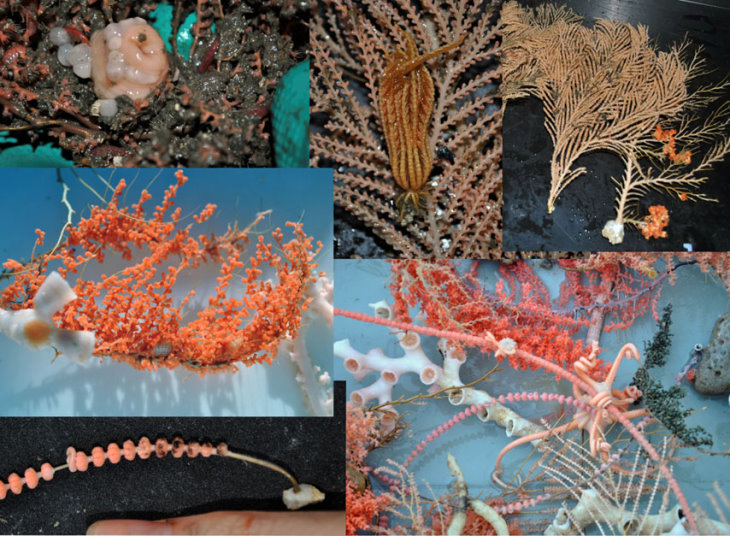
Amazing corals (Photos Nadia Cerino)
The Federal University of Technology, Akure (FUTA) has been celebrating this annual event since 2015 with the Mundus maris, Akure Chapter, this year also in partnership with Aquaworld,
Tuesday 8th of June 2021, a radio programme was aired on the FUTA Radio. The Mundus maris FUTA representatives, Professor O.A. Fagbenro, Dr. M.L. Adeleke, Mr. C.B. Ajayi, coordinator of young Mundus maris club, Staff Secondary School, FUTA, and Eweola Paul Ayomide, founder of Aquaworld, were the speakers on the radio show. The topic of the radio show was simply the 2021 World Ocean Day motto: “The Ocean: Life and Livelihoods”.
Discussions during the radio programme focused on how the ocean affects people’s lives in Nigeria, the state of our water bodies, the activities that affect life in the ocean, especially plastic pollution and how we can mitigate negative effects. There was room for questions and answers from the audience.
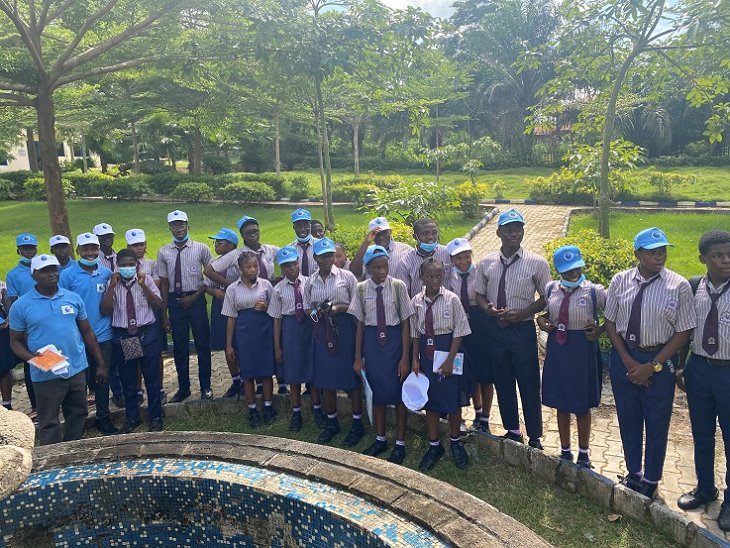
The second event kicked up on Saturday 12th of June 2021 with the “Plastic Hunt’ at the Federal University of Technology, Akure and her environs to pick up plastic materials. It mobilised over sixty (60) participants from the Staff Secondary School, Mundus maris Youngsters Club, members of the public and the AquaWorld group. The starting point was from the University Senate Roundabout through to the University cattle ranch ending at the University Wildlife Park (Prof. Afolayan Wildlife Sanctuary).
The second part of the day’s event was tagged: ‘Eco-talks’. It commenced at the University Wildlife Park. Three invited speakers: Mrs. O.O. Olanipekun, Sustainable Agro-Tech., Akure, Mr. Femi Paul Durowaye, ABU College of Agriculture, Kabba, Kogi State, Nigeria, and Mr. Eweola Paul Ayomide, AquaWorld, spoke respectively on the following topics.
-
Effects of Microplastics on Ocean Life and our Health
-
Recycling Plastics
-
Reducing our plastic footprints through exploring behavioural changes.
After the eco-talks, the attendees of the event were taken around by the park guide to enjoy fascinating views of some of the animals in the park. Then it was time for the Mundus maris quiz competition coordinated by Dr. Wole-Alo Felicia, Mr. C.B. Ajayi and Dr. Adeleke M. Lydia. Light refreshment was provided to all participants. The event for the ended with a visit to FUTA’s botanical garden and some pleasant networking.
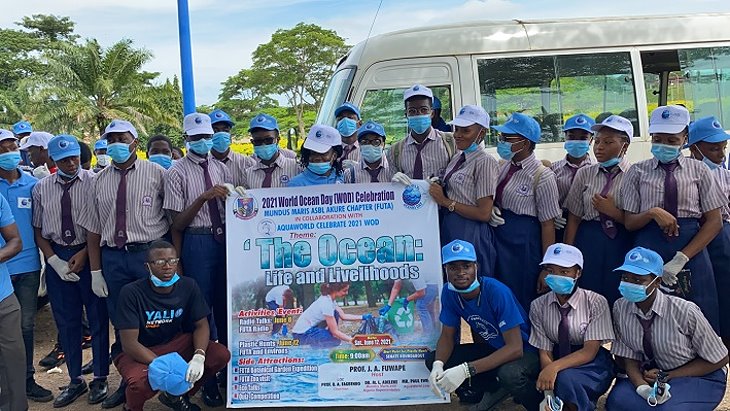
On behalf of the Local Organising Committee, Prof. O.A. Fagbenro and Dr. Adeleke M. Lydia and Eweola Paul, we appreciate the full support of Prof. J.A. Fuwape, FUTA; Prof. T.T. Amos, Dean, SAAT; Prof. A.A. Dada, HOD, FAT; Prof. G.E. Onibi, Dean, Students Affairs; Prof. Owoyemi, FWT Dept.; Engr. Dr. Fadugba, FUTA Radio; YALI Group, and all well-wishers, especially the First Lady of Ondo State, Nigeria; Mrs. Betty Anyanwu-Akeredolu who has been associating in no small ways with the Mundus maris Akure chapter. Thank you all.
How to better complete the range of World Ocean celebrations than with a musical journey around the globe, but this time not only in virtual space, but on the pleasant lake side of Kessel-lo, Louvain, Belgium.
Saturday, 12 June 2021, early evening, families and people of all ages gathered leisurely around the pavillon to listen to enjoy the play of Kristina Kebet, piano, and Sara Fontán Ferreira, cello.
Carefully prepared by Maria del Carmen Patricia Morales, Mundus maris Vice President, the mild breeze and the chattering birds formed the enchanting background to the concert.
During the short pause, Cornelia E Nauen of Mundus maris reminded the audience of the organisation's decade-long work for ocean literacy, ocean protection and using its resources in more intelligent and sustainable ways. She recalled a study suggesting that five million tons of fish more than at present could be harvested sustainably from European waters, if only less juveniles were caught and more adult fish left in the water to reproduce. She invited the audience to help moving our societies to a more respectful relationship with the ocean.
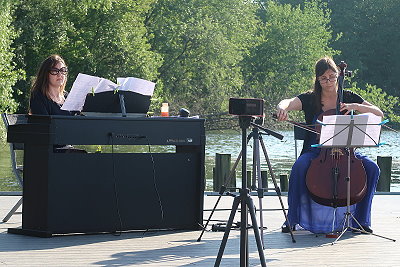 |
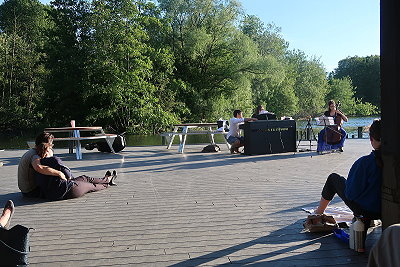 |
